#as in he is a protector and they think it fits his narrative
Text
svsss!TWSB AU thoughts....
I think I remember that someone once compared Jung Yeseo to Scum Villain's Shen Qingqiu (Shen Yuan; who are both transmigrators), and Cédric to Luo Binghe but actually thinking about it, it would be more accurate to say that Christelle fits the role of Luo Binghe more.
They're both the original protagonists of the novel(s) who are able to emit that "sticky, clingy, aegyo-esque character infatuated with the MC like a duckling/puppy" energy on the surface, but who are actually pretty brutal on the inside.... it's so gap moe (or should I say reverse gap moe?? Gap Horror). Christelle as a heavenly demon and the Emperor of all realms is also just an amazing vision too. She's rlly the type to act cute with peerless immortal master Jung Yeseo(Jesse Venetiaan)(who, after transmigrating, is only acting peerless and untouchable but is actually The Silly of All Time™) while being ruthless and mischievous behind his back. The kind of character who only shows one bright side and facade while harbouring so much darkness. SO WOLF IN SHEEP'S CLOTHING CODED. SHE WOULD FIT SO WELL.
MEANWHILE CÉDRIC....... ISN'T HE MUCH MORE LIKE LIU QINGGE HAHA—both Yeseo and SQQ used them as vehicles at some point in their respective narratives 😭 The one-sided feelings absurdly beautiful and handsome young master from a wealthy family swordsman... Cédric who vows to stand by Yeseo's side like a protector, a silent but devoted sentinel..... War God Cédric who is somewhat aloof yet has his own gap moe tsundere-ness if pushed far enough. The type that would leave presents at Yeseo's doorstep without any more elaboration that would leave Yeseo confused about his intentions.... THE SOCIAL INEPTNESS (BUT HE DOES HIS BEST). IT'S PERFECT.
((ANYWAY YEAH..... This was supposed to just be an AU word vomit ramble but now I'm actually tempted to write it out..... send help pls TWSB's ao3 tag deserves more food. A xianxia/murim AU sounds so delicious rn......))
#svsss!TWSB AU#twsb#when the third wheel strikes back#섭남파업#pendwelling writing#twsb fanfiction#twsb writing#cedyeschris#(YES OFC I'D MAKE IT CYC)
27 notes
·
View notes
Text
Better jobs for Steve than being a cop: teacher, counselor, bartender, florist, librarian assistant, garden section associate, dog walker (dog groomer canon?), grocery store manager, food pantry helper, seasonal worker as a Santa’s elf….
#stranger things#steve harrington#I could go on and on#I technically understand why so many fics make him a cop or one of Hopper’s deputies#as in he is a protector and they think it fits his narrative#but I truly believe he would be not only anti authority but also very zany like other girls#and go for something else#also acab ya know#steve harrington hc#my favorite job for him is he gets a job as a counselor at the state college he goes to when he finally joins Robin in Chicago#and he’s a young himbo with a corner office who helps wayward kids
229 notes
·
View notes
Text
ALTA Live Action Season 1 Initial Thoughts (Spoilers)
I just finished the season, and holy shit!
Quick things that need to be addressed/debunked:
“Sokka is no longer sexist”
I dont know what people were talking about when they talked about Sokka’s “sexism” being removed. It’s still there! But not in the overly exaggerated comical way it was in the original.
In fact, it’s more in line with ancient practices of indigenous tribes where men are seen as protectors and providers while women are expected to nurture. It’s not the same “boys are better than girls” narrative in the original.
Additionally, Suki still beats the fuck out of Sokka and humbled him really quick. They’re super cute by the way. And I love Suki’s “I like my men a little stupid” vibe. She’s great.
“Aang doesn’t run away like the original!”
That is not true. He does run away, but not because he’s trying to get away from the temple but instead to get some air because he feels overwhelmed. He’s more like taking a quick break and planning to come back. It’s not exactly the same, but almost. It also is done in a way where his guilt feels more justified.
“Katara doesn’t talk about her mom anymore like the original”
This is true… BECAUSE THEY SHOW INSTEAD OF TELL. I was honestly not prepared to see the death Kya in such graphic detail and how Katara was in the room hiding when it happened. It’s honestly really sad and more heartbreaking.
Plot:
The timeline seems to be ambiguous compared to the original series where it was “end of current year.” In fact, they repeat “three years” a few times, which makes me think if the series get greenlit for more seasons, it would be over a three year period.
Jet is still villainized but given more nuance and not a simple "good v bad" way like the original.
Zuko’s story about how he got his scar has additional lore that makes him come across as even more selfless and compassionate. The additional context of the platoon he advocated for in the war meeting, becoming his current crew, really added to the story.
Eradicated the nepotism baby plot point with Pakku only training Katara when he finds out he used to date her grandma. Instead, Katara proves herself and ends up teaching the other male fighters the techniques she learned from watching other benders use their elements and mimics them.
This season doesn’t have Aang learning any waterbending, but rather facing his trauma and the consequences of his actions. He get roasted by all his past lives. Which is an interesting choice, but I think it works well in how they executed it.
This season seems to actually be Katara focused and her journey of learning waterbending which I honestly loved because it really hits home the element of “water” being the story of an untrained waterbender learning her element. But, I do think Aang could’ve learned a little bending. It felt a little off.
Katara ends up advocating for all waterbending women and ends up leading an army of both men and women during the siege. She’s really bad ass and is given the title of master without being formally trained by Pakku. She made herself a master.
I think the timeline is a little wonky because of how much they had to fit in with the limited episodes they had.
Kuruk is given respect! I loved that.
June actually seems into Iroh which I thought was a funny but cool way to flip the script from the original.
The relationship between Zuko and Iroh is really beautifully executed. I love the depth they added with flashback scenes and their bond prior to the Agni Kai. It also wasn’t as frustrating watching Iroh and Zuko’s dynamic because Iroh communicated with Zuko in a way he could understand with straight answers rather than seeming to actively sabotage him with cryptic puns and shenanigans like the original.
They changed the love triangle with Yue Hahn and Sokka to be very healthy. They gave Yue autonomy and a choice in her relationship- which- again- is much more in line with indigenous cultures. Also, Hahn and Sokka’s relationship is really supportive and full of respect and no ill will.
They way they handled grief and the realities of war with the loss of life was very well done and really drove home the point that this is a war and these are child soldiers.
There’s a lot more but these are my initial thoughts. Will probably post more later.
Shipping:
Kataang is all but removed. Literally DOA. There is no indication of a crust on either side. It’s painted like a sibling relationship, which is like the original, but this time everyone seems to be on the same page. But, I swear the writers had to have read ZK fics because damn.
They canonized a popular Zutara theory/hc about the cave of two lovers and how the crystals would light up once it went completely dark instead of a “kiss” activating the crystal glow.
Speaking of the Cave of two lovers. They keep the Oma and Shu story with red and blue coloring. Making it come across more as foreshadowing than a direct link to the present tunnel story.
Sokka is put in Aang’s place with Katara in the tunnels and turned it into a story about the love of family and sibling bonds. Aang wasn’t even present.
Zuko and Katara share a meaningful look when they first see each other and continue to have a Katara centric scene followed by a Zuko centric scene and vice versa.
The scarf scene. I will not be elaborating further. If you know, you know.
Zuko and Katara fight scene in the North is epic. He still taunts her with almost the exact same dialogue but it’s so sassy- I love the banter.
Suki and Sokka were really cute and the actors had great chemistry. I think Yue and Sokka was really rushed and didn’t really feel anything about them, honestly. But I attribute that to lack of episodes to develop all that plot.
484 notes
·
View notes
Text
it took a lot of asking but riot finally deigned to discuss the lore of their billion dollar video game franchise
youtube
i absolutely called it that riot was going to retcon the Brackern/Hextech connection out of existence, but i didn't call that they'd use Arcane as the excuse to do it with. i thought they'd just quietly retcon it away with the skarner update without offering much explanation.
they say they're going to give seraphine an update to fit the new status of hextech which made me laugh a bit because, like, y'all already retconned her lore to hell and back when it turned out you had severely failed to read the tone of her connection to the brackern and launched her with a story that essentially implies she uses slave labor to be a pop star. I remember fucking marc merrill throwing the writers under the bus on twitter about it like an absolute douchecanoe.
and then, instead of engaging with any of the ways in which seraphine's powers of empathy generation could be incredibly interesting when paired with the brackern narrative that casts them as essentially brutalized victims of colonization for Piltover profit, you just go "uuuuuh, no, wait, she can't hear the brackern actually ha ha ha whoopsie doopsie." like, literally just nerfing her powers, but doing nothing to alleviate the horrible implications. "oh yeah, no, she still uses the enslaved soul of a brutalized species to power her platform, but now she doesn't know she's doing that, which I think we can all agree means the problem is solved."
hopefully they actually give her a new story that engages with her abilities beyond just "she is good at being a pop star" - building on the LoR version of the character, I would hope - but I fear it's more likely they just do the minimum viable edit and just find-delete any reference to consciousness in hex-crystals.
as for skarner himself, well he's Ixtali now so they'll probably still square him up against piltover's colonizing incursions into Ixtal, but more in a "primordial protector of the natural world" kind of way than "lone avenger reclaiming his people's stolen bodies." which, y'know, okay, sure, why not, but I would very much like him to have a more compelling character motivation than "preserve the status quo because nature and balance or something."
my big fear is they'll use the update as an opportunity to make camille a good guy or more sympathetic. like, house ferros made its fortune by selling the souls of a sentient species as batteries, knowingly, and camille was a ideologically committed defender of that decision, and that made her an interesting villain. but they've been humanizing the living hell out of her and i am real worried they're just going to tip straight on over into "oh no the authoritarian enforcer for the bourgeois power structure is sympathetic actually, she's really nice once you get to know her, she's just misguided" and ffffffffff
just... please let camille be evil. let her be a villain, please for the love of god
#tb posting#league of legends#skarner#camille league of legends#seraphine#brackern#piltover#hextech#Youtube
293 notes
·
View notes
Text
Rise Ponderings:
The Turtles With Japanese Names
I've seen a lot of headcanons lately that support the "Rise boys' given names ARE their colours and they only got the artist names later on" narrative so I'd like to share my own.
Rise Splinter is undoubtedly very Americanised but I think that despite him forsaking his familial duties and old life, he’s still Japanese, is still a Hamato. So, subconsciously, he gave the boys Japanese names (of their corresponding colours, of course).
On that note, for all that Splinter has Celebrity-Who-Gives-Their-Kids-Unique-Names energy, I believe that he would still have enough decency to give them somewhat proper Japanese names not just 'Aka', 'Ao', 'Murasaki' and 'Orenji'.
However, for a period of time, the English-colour-names Splinter uses in the show would have been how addressed each other because they are, for the most part, an English-speaking household. Until an eight-year-old April came along insisting that those weren't 'real names', the turtles English names were 'Red', 'Blue' etc.
After adopting 'proper' English names, those became the common form of address, though Splinter still calls them by the English colours because it's a habit for him. They don't mind.
They don’t use their Japanese names often. It’d mostly be during serious-talk time, in official stuff, calling someone by their full name or teasing.
Ironically, in Splinter's (read: my) effort to not be a basic bitch, most of the boys' Japanese names are female. You can bet they tease the shit out of each other about it. The only one that actually takes offense to the teasing is Donnie whose name is very common and recognisable, so he always gets asked why he has it and/or if he realises that it's a girly name.
The Names
*NOTE: I'm using Kanji here. Fair warning, they could be written wrong, so if there are any Japanese speakers out there, do correct me.
Hamato 'Raphael' Shuiro

Shuiro 朱色 = vermilion
Raph’s name is the only one that isn’t a real given name but I thought it suited him.
Colour Symbolism:
Besides being one of the most dominant colors in Japanese culture, red is associated strongly with authority, strength, sacrifice, passion, joy, and happiness. It's also regarded as an auspicious color in Japan.
Frequently said to have Eldest Daughter Syndrome by the fandom, Raph is the ultimate authority among the brothers. He self-appoints as leader not because he necessarily wants to be, but because as the oldest and the biggest, he feels like it's his responsibility to look after the others. Which often takes great strength and sacrifice. Surface Pressure from Encanto, anyone?
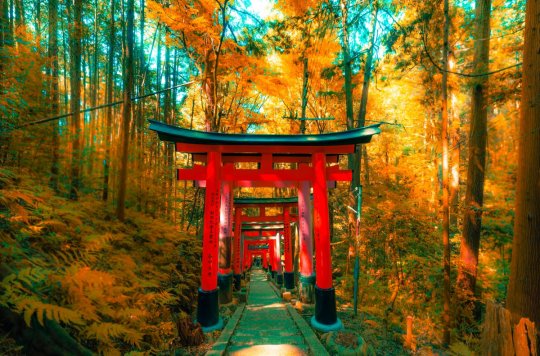
Furthermore, red, specifically vermilion, is very symbolic in Japanese architecture:
Red is the color of torii – Shinto shrine gates – temples, and traditional daruma dolls. Red is said to scare away evil spirits and represent protection, strength, peace, and power.
All in all, very fitting for the big brother and family protector, if you ask me.
Hamato 'Leonardo' Aoi
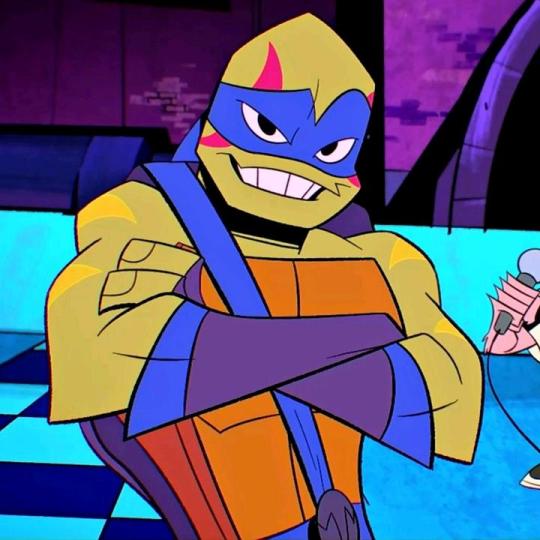
Aoi 青い = blue
Aoi is a unisex name; meaning hollyhock flower when used for girls and blue for boys. I'm using the male meaning for Leo.
Colour Symbolism:
Blue commonly represents the sea and the sky (for which Japan is surrounded) and symbolizes purity, dignity, calmness, stability, security, and fidelity. Blue is also regarded as a lucky colour.
In this case, blue is rather in juxtaposition with Leo's personality, but looking at it from a franchise perspective, blue is indeed a leader's colour.

Back then, Japanese society was strictly hierarchical and displayed through the colour of their robes. Of the colors that were allowed for common folk, the color blue was work by higher ranking people. It symbolized wealth and prestige, while also remaining a color of the common folk.
That being said, Leo's a little different from his predecessors. Eventually, he will grow into the role of the leader we know and love. But even when he was unburdened from being leader, he was still the strategist. Leo's leadership in fights is a balance between what is uniquely Rise and the mission-mindset of the leaders in blue who came before him, strategies that are fun, wacky and maybe a little unorthodox yet still as effective for the team.
Hamato 'Donatello' Sumire
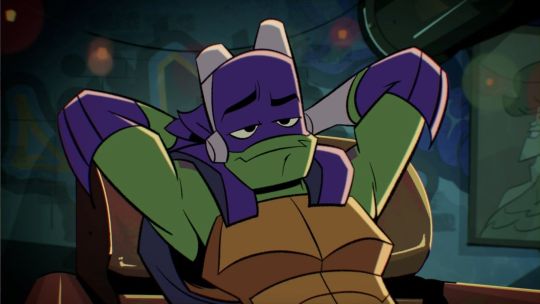
Sumire 菫 = violet
Sumire is usually a girl's name but I don’t think Splinter would’ve cared all that much about gender.
Donnie doesn't either and even likes his name, though it has caused him a lot of grief over the years. A lot of people think it's strange for a guy with his personality to have such a feminine name, and he's really sick of having to defend his name after introducing himself. Part of why he wanted 'Donnie'.
Colour Symbolism:
Like in the West, purple in Japanese culture is associated with royalty, as purple dye was rare and only available to those of a higher status. It can also reflect on nobility, spirituality, and wisdom.
Out of everyone, Donnie embraces his colour about the most. His clothes are purple, his tech is purple, his lab is bathed in purple lighting. Purple is Donnie's thing. This, in a way, ties in with the colour's exclusivity back then.

Flower Symbolism:
In Hanakotoba (flower language), the meaning of violet is sincerity, a small love, and a small bliss. Violets are a common gift, as they are an ideal way to show appreciation for a family member or friend and to express sincerity or love.
I think this is very Donnie. What he lacks in the emotional department, he makes up for through his tech. He creates things for his family, making them all kinds of personalised gizmo. Sometimes it results in disaster but the intention to help is there. Gift-giving is his love language.
Hamato 'Michelangelo' Mikan

Mikan 蜜柑 = tangerine
Mikan is a common Japanese girl name. Baby girls named "Mikan" are usually joyful, positive-thinkers, smiley and generally happy people.
Mikey loves his name and doesn't care that it's girly and cute, no matter how the others tease him about it. (SIDE NOTE: I swear the near-matching names wasn't intentional. I was just looking for a name that means mandarin orange for a bit I'm writing).
Colour Symbolism:
Orange is symbolic of love, happiness and the sun.
The youngest of the family, Mikey is optimistic and cheerful. He brings joy and colour to the household through his art. He encourages everyone to be express their love openly and always tries to be supportive.

Fruit Symbolism:
Besides good fortune, wealth and longevity, the fruit mikan can be tied to family because of its role in Japanese traditions. In Japan, there is a word “Kotatsu de Mikan”, which means:
A family sits around a kotatsu (a traditional Japanese table with an electric heater attached to the underside), watching TV and eating mikan — the traditional picture of a harmonious family seen in the wintertime.
TLDR; I really love how each turtle has a role to play in the family, how their respective colours are so appropriate for who they are as people, and I wanted their Japanese name to reflect that.
Mikey is all about family. He's the heart, always the peacemaker, always bringing everyone together.
----------
#the pics aren't mine#So many iterations of TMNT and no Japanese names?#A travesty#rottmnt#rottmnt raph#rottmnt leo#rottmnt donnie#rottmnt mikey#japanese names#rottmnt headcanons
2K notes
·
View notes
Text
yknow, no, i'm not done thinking/posting/being deeply angry about the whole "bbuuuhhh Astarion is gay and was made playersexual as a game mechanic bbbuuuhhhhhhh" garbage some people still spout.
like this type of sentiment is always annoying and wrong, but it's specifically this character for whom it's especially annoying to me, just because on top of all the regular host of issues, it also deeply contradicts what I believe is the central theme of his whole goddamn story.
(excuse the rant please.)
Like, my skin already crawls at that term, "playersexual". I hate it, and find its use either vaguely ignorant at best, or blatantly pan/biphobic at worst. but even just besides that....
This character is a man whose narrative intentionally shows his presentation of himself, and of his masculinity, as being contradictory with convention. This character is one whose entire arc is about discovering who he is beyond the boxes he was assigned: a spawn, a monster, a seducer, a tool, a predator, a plaything, a victim, a sexual object... these are all identities that were forced onto him. And if he's given space to discover them, turns out, none of them are things that he actually wants to be. if you give him space, and affection (romantic or otherwise), and acceptance, and help him attain closure and catharsis, he expresses desire to be... an adventurer, a lover, a friend, a protector, so many things, but all of them in his own way. That's the point of his story, control vs. autonomy.
How.... myopic does one have to be to see that story, to play that story, to play an active, participatory role in that subversion, that search for the self beneath the masks, and declare that actually, they made him this other box for him to fit into, so... it's fine, i guess, to ignore what he says?????? it's fine if they pick and choose among his expressed traits which ones to use and which to disregard, because they decided (based on frankly homophobic and rather misogynistic stereotypes) that he cannot be different from their perception, despite him literally saying otherwise????????
Astarion's entire figure is a succession of trope-subversions. I could write essays about all the ways in which, in the romanced spawn game, the narrative sets up tropes (primarily in act 1), only to then purposefully knock them down and contradict them as the game progresses.
Like..... He was to take revenge by taking power for himself (like he thought he wanted, like Cazador did to Vellioth): ended up taking his revenge and rejecting the power that could have come with it, and despite that having a price, being content and grateful for it (and realizing that the alternative would have had an even greater price he would have paid unknowingly). He starts out using sex and sexuality as a weapon, and a tool of manipulation, like he did for many decades: ends up expressing discomfort with being seen as a sex object, resuming his sex life by saying "I love you" before his partner would have, and proposing sex with them as a beautiful metaphor for his own rebirth.
His whole story starts out with him thinking he requires protection from the player and that the only way to get that is through using his body and looks as a bargaining chip: later he discovers in himself a desire to be the protector himself, which he talks about more than once, and expresses varying degrees of discomfort at the thoughts of both using his body to gain something, and needing a protector.
There's the "this is what I'm good for" type of attitude towards sex morphing into "I am so much more than a thing to be used". There's the whole thing about how important his looks were to both him and his "usefulness" back then, despite him not being able to even fucking see them, (which also kind of includes that silly lovely gremlin-face he sometimes makes), but those are just the ones off the top of my head.
The story, and the romance plot, is about... it's about him regaining ownership of himself, it's about autonomy, his whole recurring "what do you want" line is about respecting his choices and letting him find his way to them, it's about letting him show you who he is, believing him, and loving the man behind the facade.
how absolutely fucking short-sighted does one have to be to then take that incredibly reductive stereotype of "femme-leaning man with theatrical mannerisms who cares about his looks; must be exclusively homosexual and any attraction he shows to women is just a mechanic/fanservice/flattery" (which, that's so fucking insulting to gay men, and bi/pan men, an any man who might express masculinity in a less than conventional way, and to the women who may love them [eta: and of course nonbinary people, and the people to whom masculinity means something wholly different]), and assign it to this character on their own accord, despite him literally telling the player otherwise? despite him verbally expressing attraction to multiple women, and contradicting that stereotypical interpretation wholly and out of pocket??????
like, hello??????? did we play the same game????????? did we play the same fucking game??????????
like don't think for one second that it isn't the pan/biphobia that annoys me more, it absolutely is, but this character is such a particularly egregious example, it's almost fucking poetic.
#squirrel plays bg3#i feel like this needs a tw but i just. cannot think of what#i'm just..... annoyed. and ranting. and my brain is full. and i'm hungry.#point is; where Gale's central theme boils down to an exploration of devotion#Astarion's is about autonomy#these are the only two i've done so far so i've not yet looked this much into the others#next is gonna be me ranting for hours about Shadowheart's theme of sacrifice; just you wait#(i hope the person who replied to this post; deleted their reply; and then blocked me#knows how heartily I just laughed at that little sequence of events)#(it's like seeing; idk; a bottle of nice healthy kale-spinach juice discarded in the liquor aisle of a supermarket)#(a telltale sign of DecisionsTM made)#(I can respect a “yknow i don't want to engage with this today”)#(even if i will just outright say that i believe i'm right)
37 notes
·
View notes
Note
Well since we’ve started speculatin’ already—- what do you think a good Kar’niss companion quest would be? Finding memories of who he used to be? Exacting revenge as well? Maybe just coming to accept himself and calm the eff down through FRANDSHIP. Maybe his whole quest is just slowly learning to trust tav more until completely aligning his goals with theirs (so if ur dark urging he will twitchily ask when it’s time to kill somethin; if you are not he wants to be a good nice boy).
There are lots of directions to take Kar'niss in. For the sake of time I'll focus more on the "good" paths as I think the bad are easier to predict.
-His top priority would be finding a way to undo his transformation. His drider shape is arguably very cool but it's not comfortable. Driders are in constant pain, not to mention it'd be hell on earth trying to fit into surface society looking as he does. What if Tav is a shorter lived race? Drow can live for up to 750 years and we have no idea how old Kar'niss is. If Tav dies and Kar'niss is still a drider, who will be left to protect him from dark entities that would use him for coin or other means? So I think from a storyline standpoint, that'd likely be Kar'niss' main goal.
-Another option is, as you mentioned, revenge. If Tav breaks him from the Absolute's hold and he realizes that he's been used he will become enraged and gung-ho to take them out.
-The third, which can run in conjunction with the other two, is healing his broken mind. I've mentioned this before but I don't believe Kar'niss can ever fully recover. It's simply not how trauma works. People may find ways to cope, to go on with their lives and maintain a speck of normalcy, but the damage is already done. He will have bad days, he may even continue to have psychotic breaks that Tav will have to find ways to work around. That doesn't mean his situation is hopeless of course. He'll still be grateful to have some sense of autonomy returned to him, to have someone close by that loves him for who he is, flaws and all. In return Tav gains someone who is incredibly loyal and affectionate, a protector and a confidant.
His is, like most of the companions, a sad case. I feel like BG3's main theme is about different kinds of trauma and how people cope. It's a nice narrative through-line and Kar'niss is primed to be included in the growing list of sad meow meows folks keep running into.
Thanks for the ask!
57 notes
·
View notes
Text
due the recent discussion about the ancestral connection between these two I wanted to say something about their thematic overlaps. Brienne and Dany, among other female characters, and how their stories is in vague conversation with each other is something I really love because I do think there are a lot of parallels ingrained into their narratives. I adore how they are thrust into, or in a lot of ways choose to embody, “traditionally masculine” roles. In the meta sense too, like their narratives are about filling the role reserved for male fantasy protagonists. Brienne is the Protector and the Knight. Dany is the Conqueror and the Savior. They are a deconstruction and reconstruction of these tropes. They also have a lot of differences too, which just elevates the whole thing in my eyes because it really hones in on what it is to be gender nonconforming and how fluid that whole idea is.
Brienne’s role exploration is so clearly delineated, but it is still about duality:
“It was the gods who neglected to give you a cock, not me."
"Lady Brienne?" She looked so uncomfortable that Jaime sensed a weakness. "Or would Ser Brienne be more to your taste?"
"Give me the sword, Kingslayer." "Oh, I will."
bound them face-to-face. “The lovers," Shagwell sighed loudly, "and what a lovely sight they are. "Twould be cruel to separate the good knight and his lady." Then he laughed that high shrill laugh of his, and said, "Ah, but which one is the knight and which one is the lady?"
but the faint light revealed only Brienne of Tarth, her hands bound in heavy chains. "I swore to keep you safe," the wench said stubbornly. "I swore an oath." Naked, she raised her hands to Jaime. "Ser. Please. If you would be so good." The steel links parted like silk. "A sword,"
In this light she could almost be a beauty, he thought. In this light she could almost be a knight. Brienne's sword took flame as well, burning silvery blue. The darkness retreated a little more.
"Ser Galladon was a champion of such valor that the Maiden herself lost her heart to him. She gave him an enchanted sword as a token of her love. The Just Maid, it was called.
"I will ask after her. What is this woman to you?" “My protector."
It is still about this idea that you are not really restricted by gendered tropes. (This duality is also present in the Bear and the Maiden fair, and the BaTB reconstruction. The point is that they are both simultaneously.) She has a complicated web of motivations: love, trust (a lot on gender constructs here too), and her own altruism. You can be the romantic heroine, as well as the knight: the protector. Same with Dany. She can be conqueror, savior, and mother. The whole point is the taking apart these dichotomies and constructs.
Dany echoing Rhaegar: “I will require sword and armor. It seems I must be a warrior.'"
And saw her brother Rhaegar, mounted on a stallion as black as his armor. Fire glimmered red through the narrow eye slit of his helm. “The last dragon,” Ser Jorah’s voice whispered faintly. “The last, the last.” Dany lifted his polished black visor. The face within was her own.
Dany takes up Viserys’s role, she takes up Rhaegar’s role, she takes up Drogo’s role. But she is still the mother of dragons. I think what George wants to emphasize with a lot of these characters is that gender and the constructs around it are very complex and you are not gonna neatly fit into the strict boxes that society forces you into. When that happens, characters often end up in ruin. People are not meant to fit into these rigid boxes. Anyways, Dany’s story is filled to the brim with this duality as well: it is present in the sun and moon symbolism (lol also Brienne’s sigil), as well as the AA prophecy subversion. The flaming swords are forged with the burning of her husband etc, again the genders become switched. But it is not about one or the other. I think really it is like: Dany must become the conqueror, the warrior, the executioner even, the butcher, because she is a mother & savior. Because she is also a protector, nurturer, and planter. For her children. Also, how “the children” represent the self for her. Like they are/were her. But she has power now. A sword/dragons. It is such a large weight on her shoulders. What does her inaction mean? What is her obligation with that kind of power? She must get blood on her hands to save her children, and to in some form save herself. What does “better to be the butcher than the meat” really mean? I read Brienne the same way. She is not a knight for glory and empty chivalry. She has some vindictive tendencies rooted in her trauma, but at the end it hurts. She is a knight to protect. It is rooted in the fact that she is a lover. They are both so selfless, they are both so strong. But their fight is also ultimately a fight for themselves too.
And to finish my little mwuah love note about my two favorite female characters in the series, this is such a cute little romantic parallel, even though they are filling opposite roles in it:

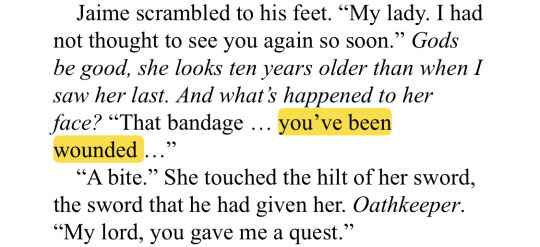
140 notes
·
View notes
Note
What do the people in Driftmark think of Lucemond ruling them? Also Heleana and the kids staying there?
In short: their overall pretty decent Lord (who happens to be an omega) and his very scary guard-dog-husband (plus live-in sister-in-law/aunt and cousin-niblings).
With Luke particularly I do have Additional Plot that has yet to be included in the fic which is that not long after Corlys dies (and Luke inherits the Seat) a particularly harsh winter blows in and it kind of becomes the Final Test of both Rhaenyra and Lucerys to convince the people that they are worthy to rule despite their designations. And they both manage to guide their people through riding it out fairly well. So while there will always be people unhappy about omegas sitting on important seats for most people that winter is enough for them to at least come to the conclusion that Targeryans Are Exceptions and even omegas in that family are Fit To Rule. So while it's still not smooth sailing for Luke for the most part people are happy enough he was the one to inherit.
Aemond is a bit styling himself after Deamon. And if you actually think about it the only Daemon Aemond really knows is Domesticated Wife-Guy Daemon. So while I don't think Aemond's got the exact same flavour of obsession with Luke as Daemon has Rhaenyra, he definitively ends up with the similar reputation of "violently protective of his mate". Plus you have the fact that after Corlys dies Aemond is the only Alpha in the House (until the kids present) so he internally tasks himself with being The Protector of it. Also once the whole succession thing settles down he starts going out conquering in the name of Driftmark/Luke. So he has an intimidating presense, a protective streak, and the achievements to back it up - he's Scary. But he answers to Luke (partially because learning off Daemon, partially because if he was seen as challening/questioning Luke others would see it as an invitation to as well, and partially because Luke grew up learning off Rhaenyra how to 'handle' alphas like Aemond).
Heleana is a bit of a funny one where I think the Gossip that goes around her and the kids isn't that they're Aemond's but that she and Aemond conspired to ensure Aegon didn't get the crown for the Good Of The Realm. Because Aegon kind of more and more gets himself this reputation as a emotional unstable drunk pretty quickly after Rhaenyra takes the thrown (which is also when Heleana and the kids come to visit... permanently). I think people started to wonder if she had seen the signs of Aegon being unstable before the King died and perhaps asked her other brother to help ensure the safety of herself and her children from him. Sure, there are probably some people who question the parentage but there isn't actually that much evidence if you don't know the full story - Luke is perfectly pleasant to Heleana (and it is ultimately his house not Aemond's) so there's no obvious jealousy to tip them off and I mean even with the kids having some of Aemond's features that's like... he is their uncle on both sides. Even Aemond doing things like training the boys or taking them on as Squires or weighing in on potential matches, that's all something a Good Uncle would do (especially when their father is not around). The narrative of "Aegon was a cruel husband and Aemond and Luke sypathised with Heleana so offered her and the kids refuge" fits with all the evidence people have and is still juicy enough to make interesting gossip (plus is a bit more sweet then "yeah they're political prisoners to keep Aegon in line" which is the other non-said narrative).
The more I think about it the more I think people say Driftmark is a King's Landing in miniature - both have an omega at the helm with their guard-dog-alpha-mate by their side, housing the wife of the previous/almost King.
#lucemond#aemond x lucerys#aemond targaryen#lucerys velaryon#lucerys targaryen#heleana targaryen#HOTD#GOT omegaverse#omegaverse#GOT mpreg#mpreg#House of the Dragon#GOT#Ramblings of the Goddess#Q and A with the Goddess#Anon question#The King's Landing in miniture idea definitively has supporting evidence of#Daemon will sometimes join the Going Conquering#(I mean Aegon also joins at times as well)#(it becomes a bit of alpha bonding for them)#Of course Aegons instability is actually tied to#how much he feels like he has Nothing after Rhaenyra takes the throne#especially after the revelation of the kids possibly not being his#but the general people don't know that#all they see is an emotional unstable drunk who sometimes rants#about his brother stealing everything from him#thus... the narrative
70 notes
·
View notes
Text
Trapped in new roles; SPN finale 15x20
There are a couple of ways you can take the finale, ranging from face-value to throwaway to the psy-pop-Sybil darkest of the dark. In this take, we're going to examine it as a trapped narrative, that here's the Home Bakery: the actual Cas, Dean, Sam & Jack.
The rest is set-dressing. It’s filled to brim with specter of the false-god-writers, agents Kripke and Singer, "miming" what they think the plot and finale should be. They are satirical and glib, missing their hearts and forever married to the Original Ending Idea and unwilling to grow. Uncanny valley- types.
Here, they’ve taken a family that is more than blood, (with Bobby Singer-style) dynamics, and they’ve force-fitted it to a nuclear family symbolism in order to kill it. The vibrant village community has shrunken to become pre-packaged American dream.
///
This is the Crowther family (sounds like crowder), of which only the father and youngest son are named aloud (Lyle and Brady). This family is being killed to appeal to your heartstrings.
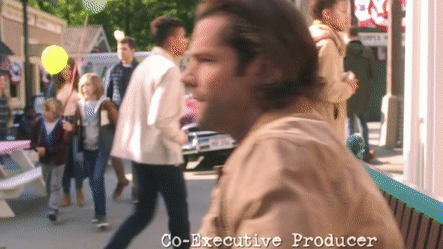
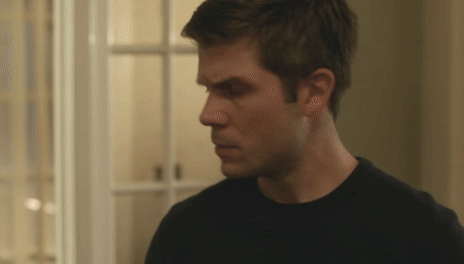
1. Castiel falls; the first line of defense
Castiel is this black-and-tan-sentry of the door. This character has slightly Jack-and-Dean-esque style in terms of style (shoes and dark shirt + jacket) but he visually dies as Castiel did in 12x23. The writers break the shield (heavenly!protector) and move into the symbolic hearth of the home. They overwork him and drain him of all vitality and happiness before he goes.
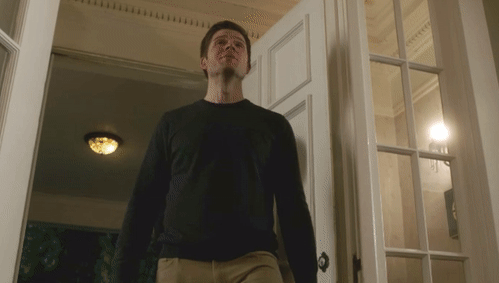

2. Dean falls next; the second line of defense
This is the character they symbolically kill, but leave (bodily) intact. The one whose tongue they cut out. (As in Proverbs 10:31, "The mouth of the righteous flows with wisdom, But the perverted tongue will be cut out." Ergo, Dean is no longer righteous. He is corrupted. Broken.)
The reaction shot calls to mind the mated reaction shot to the 12x23 scene above. Sam and Dean BOTH have a reaction to Castiel being felled, but visually this character is more similar to Dean.
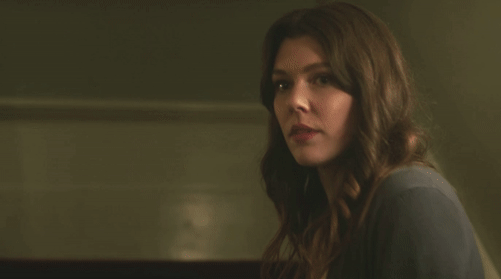
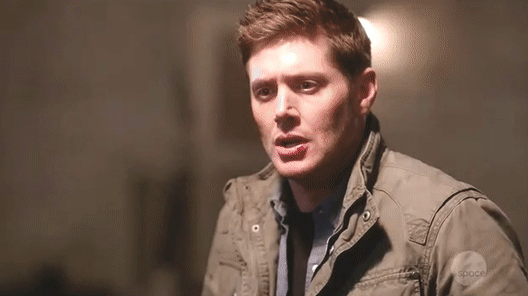
This could, of course, call to mind Kelly or Mary or even Sam, but her duster is long and gray, like a MoL robe. Below: "Lyle?" / "Cas? Where's Jack?" (Bonus: green eyes)

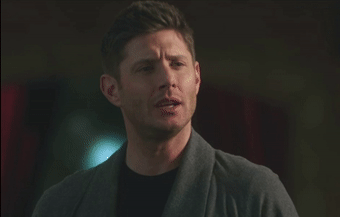
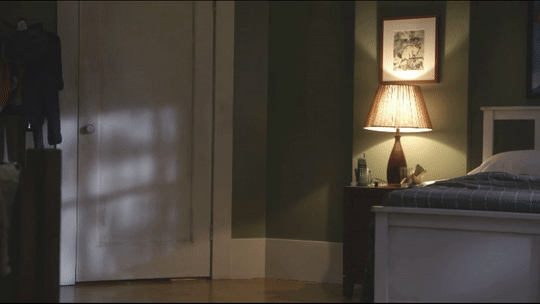
(Goodbye, Dean.)
3. Sam in despair, bunkering down with another family member, still not safe
This one is easy to see. There's long hair, and Sam is wearing the same gray hoodie in the exact same episode, perhaps the most clear visual cue of all. The child also wears an orange jacket, which is the deep amber of endurance and one of Sam’s key colors.
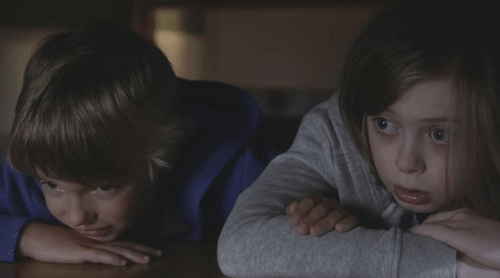
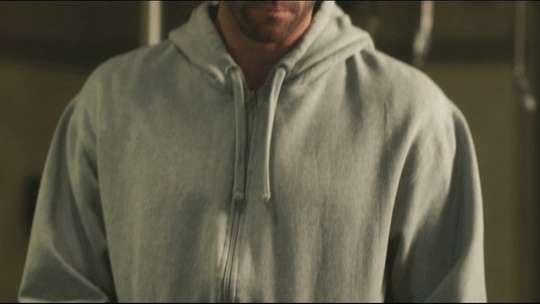
4. Jack is last family member, clothed in the garb of Heaven (deep blood + blue sky)
The last family member's got the yellow balloon and blond hair, symbolic rising sun/son (Jack). He wears slightly Chuck & human!Cas manner of dress, signaling the humanity trapped inside the divinity. Ergo, the lineage of Chuck->Cas->Jack. (The blue is Heaven, the deep red represents royalty. (Bright red is blood and sacrifice.) Ergo, “royalty of Heaven.”

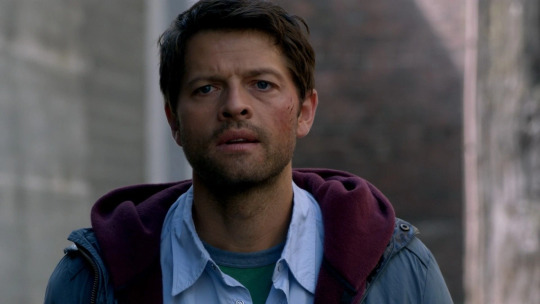

(First two images, Mikael.)
So, in the end, Sam and Jack were visually "saved," within the narrative.
But were they actually? They are both tied to destinies that feel empty and going-through-the-motions, like they're stranded on the island inside the childhood bedroom.
Symbolically, the trapped narrative almost seems to pick up where 15x18 Despair left off...

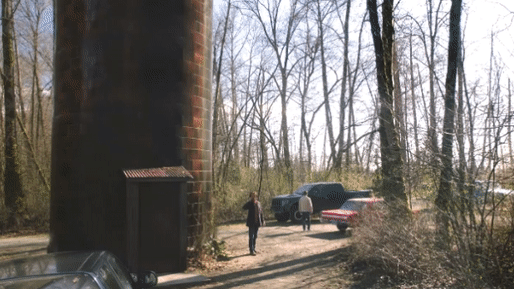

...except it continues the poofing of the loved ones, rippling outwards from Cas, before then moving to Dean, to Sam, and finally to Jack, watching as his remaining family member is dragged out from under the bed and ripped away from him.
///
It seems to suggest that, even if Cas and Dean hadn't, as Billie said, "been in the wrong place," that there was really no hope to start with. As Dean lamented, "we never should've left Sam n' Jack," like Amelia Novak lamented, "I never should've left her (Claire)." (The failed protectors’ refrain in SPN is, “I never should’ve left them!”)
But no matter where Dean and Cas were, they were never going to save Sam and Jack.
The writers were always going to win.
The ghostly specter of this episode is unsettling and unreal, oddly picturesque and "Charming Acres" -styled, like this shot reminiscent of the Monet-style painting.
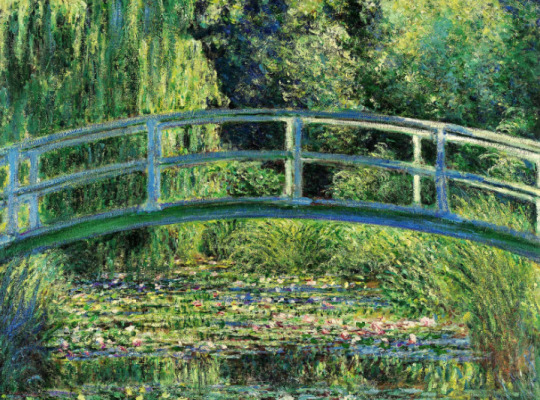

It's a false world.
("What did you do to Dean? What did you do to Sam?")
Maybe I killed them? Or...maybe you just don't recognize them. Maybe I gave them new roles when they refused to play the right ones. Who knows, Becky? All I can tell you for sure is that I won.
Charitably, maybe the fight ain't over. I offer this to Becky's "No one even mentions Cas!"
It's from Ouroboros:
Castiel: It's an odd and glaring omission.
Sam: No. It's our shot....yeah. I-It's risky. But I-I think it's probably our best play.
Come on, Sammy. Break out of it.
#cw spn finale#cw dean death#spn carry on#spn 12x23#chuck won theory#tfw + play your roles or perish in new ones#this has been niggling my brain for eons#i do hope you like it#i really love the parallels and it gives me something to like about the finale#chuck force fit and twisted the family structure to fit the same old story he always tells except this time both protectors die#chuck took their unique family and stripped it molded it till it fit an acceptable origin story for the new sacrifices#this was very fun to poke at despite it being the finale :-)#i don't even care if it's been done already i just wanted to have my thoughts recorded somewhere yanno?
32 notes
·
View notes
Text
I always have thoughts about book-to-media adaptations running in the back of my mind these days since it’s part and parcel of our fannish landscape. There’s just so much that goes into translating something from book to a visual medium. And then the adaptation fails in some small and/or large way and it ends up being a disappointment. (I think there’s also a lot to be said about adaptations that are more Successful than not and what success means in an adaptation…but I think that deserves its own post.)
I’m often considering a person’s entry point to adaptations, whether it’s through the media or the original source, and how that plays into people’s reactions about failures of adaptations or—like, what each person is wanting to get out of the adaptation if they know the original source material. And what they’re happy with when they’ve just discovered it through the adaptation.
Just gonna ramble a little bit about my own experience with being a book-to-adaptation person. I think even when writing and production circumstances are the most ideal, it’s still fucking hard as hell to adapt complicated narratives to the screen. Still. I’m not immune to heartbreak about seeing something play out badly because I had been so attached to the original book material.
When I was a little girl I picked up a fantasy book featuring a little girl protagonist. This main character was living in a foster situation, had dead parents, and a wishy-washy background she didn’t know much about. She was a little bit of a ruffian and kind of defied everybody and everything because she had a very strong sense of self and moral code. She is, of course, a child of prophecy and has a lot in store for her.
Over the course of the first book she ends up embroiled in some social and political intrigue and ends up going on a grand adventure. She meets an outcast who is is hated by humans but they use his services anyway because he’s good at his job. He ends up becoming her protector and guardian and would do anything for her.
She eventually crossed paths with a world-traveling misfit with who brought levity and a heart of gold to every scene. She also ended up meeting a very old, very beautiful witch also fell in love with this child and would move heaven and earth to protect her and help her survive and thrive.
The whole series deals with a lot of complex issues of the moral and social variety, and there’s a running theme about how men and institutions headed by men wield their power and try to impose their vision of the world on everyone. Particularly on women.
The little girl also eventually found out that her dad isn’t actually dead like she was told. The dad is alive and well and he’s asshole, also a bad guy. But he has the MOST CHARISMA EVER, holy fuck.
I ate these books up as a kid and reread them over and over and my brain and heart totally grew around them. I admired the protagonist and her sharp wit and mouthiness and determination. Her resiliency and perseverance to do what she knew would be right and just. As I got older and I reread the books and absorbed the more complex issues about personhood and agency. I thought more about how you can resist a bad situation or person when the world/person is trying to change you to fit their ideal. (That part was particularly important to me when I was young). But also the themes of good and evil, etc. I started seeing the politics and then understanding it more with every reread over the years when I started reading more history, more politics. It had always been there in the books but I could finally SEE it. It felt like a revelation.
A dozen or so years later it turns out someone was going to going to adapt these books! It was much discussed and heavily anticipated. These were well-known, beloved fantasy books from the 90s. Amazing characters and great scenes! Fascinating themes.
God I remember being so excited when I heard about the adaptation. And then I got to see it. It was the most confusing and disappointing experiences of my life. What I ended up seeing was pretty. Great costumes, CGI. Amazing actors! But everything that made the books interesting and magical and profound had been watered down, elided over the moral complexities. Or it outright changed things that would have fundamentally shifted the events of the rest of the books and make the adaptation even MORE incomprehensible.
I’m talking about the 2007 film adaptation of The Golden Compass from Philip Pullman’s trilogy His Dark Materials. A lot of this probably sounds familiar to my Witcher mutuals, right?
Anyway.
The film had so many boycotts by the Catholic Church and other churchy groups in the United States for its depiction of institutionalized religion in Lyra’s world. So on the studio-side they made so many changes and demands that fucked the movie. So much doesn’t make sense or is just pales in comparison to what was actually originally intended.
After the film’s flop even more articles and reviews came out talking about Tom Stoppard’s original draft of the film and the director’s first take on the screenplay. Vulture read both versions and it's really illuminating what they discovered. The film was indeed supposed to be significantly longer but the studio wasn’t having it because they wanted kids to go and see this film and 2+ film wasn’t gonna be it.
Like. The studio was really hoping for another Harry Potter franchise and were treating this book-to-film more like a YA fantasy type of thing. When in reality someone wrote a sanded down version of the story for the screenplay that left me and a whole bunch of other people fucking jaded as hell. Because damn. Way to miss the fucking mark on an amazing fantasy series. 10000% missed it. I’ve blacked out most of the actual film from memory because I just could not believe it. The disappointment. The heartache of not doing the story justice.
But yeah…just… someone really thought The Golden Compass was gonna be a huge fantasy action/adventure hit because there were really cool talking animals.
It’s so fucking hilarious to me in retrospect. When you realize these books are Phillip Pullman’s AU fanfic/fix-it of Paradise Lost where Lucifer gets to have his revenge on the kingdom of heaven, there was noooo way that original film was going to even begin to set up a 3 or 4 film franchise. Nooo way.
The first book ends with an absolutely heartbreaking and horrific scene that is the catalyst for Lyra and what motivates her for the next 1500 pages of the series. I was there opening weekend in that theater for The Golden Compass. I have never been more confused in my LIFE while watching a film because they ended the film like 5 chapters before the end of the book. They lopped it off and made the first film a very strange Cliffhanger for a sequel that would absolutely never get made. I was flabbergasted.
The disappointment. The confusion. The despair. I was fucking depressed about it for a good long time. I had been so excited and been brimming with anticipation because I loved the books so much and I wanted it to be good and then what I got was….absolute garbage. To me. I mean maybe if I had been a little girl watching the film for the first time it would have been better. But as an adult who had spent the better part of my life immersed in Lyra’s character arc… I just. Could not feel more betrayed.
I can’t even be that upset anymore because I’ve had enough time to grieve and leave it behind. Then somehow the universe came together and HBO let Jack Thorne and company re-do the books as a series. It is a much more faithful adaptation. I’m too close to the book source to know if people who don’t read the books will get the same kind of experience out of seeing the show play through Lyra and Will’s experiences in the show.
The final season of His Dark Materials was also probably the most philosophical and abstract season of fantasy television I’ve seen. I fucking loved it. I don’t think it was perfect, but it was really enjoyable and did more to soothe my soul than I thought possible. It’s not a show for everyone—and I’m still not sure how it got made because HBO the last few years had been going through some changes. Maybe I’m very sentimental and forgiving, I don’t know. The narrative pacing was a bit weird to me in places and some of the dialogue was hit or miss but overall, I could not have gotten a better time from it.
That experience with the film a has made me much more intentional about managing my expectations of how I approach media adaptations.
Where am I starting with an adaptation? What am I hoping to get out of this? Who is making it and what are the production constraints working against it? How do I manage my expectations if I know the original source and what do I want from the visual media and acting? Etc etc. Do I want to go and read the original if I don’t know it already because I want to see what changes they made?
I keep thinking about everything with The Witcher Netflix. It’s so fucking difficult to get anything made through studios and networks (especially now, but even then in the late 2000s)… And when you’re trying to appeal to the widest audience possible, you’re only going to get so far when you’ve left the rest of the source inspiration on the table. And didn’t bother to make up for the difference in what you left there.
We all know how depressing it is. The streaming model has fucked television over completely. The depreciation of writers rooms… we had 20 and 22 episodes, and then 15 and 12 episodes. Filler episodes with great character moments. Space to flesh out complex narratives with nuance. And now 8 episodes as a standard runtime. The lack decent amount of time for production (including pre and post) to actually set things up in a way that serves the media narrative.
It’s so hard to cater to everyone when you’re drawing from a book/comic book. Also harder to cater to your specific audience. But when you’re trying cater to enough people so you don’t get cancelled and keep going to try and tell the story you’re trying to tell, that’s fucking hard and shitty and I don’t begrudge them for that. Even though it sucks.
Even though I can hate it as much has I can understand it. Wish it was different. Even though it can be a fucking travesty of epic proportions because these writers/showrunners/directors don’t get the space to actually flesh out what they’re trying to do.
Even if people are writing a very different iteration of the story that I don’t like/want/agree with/understand/etc.
That doesn’t even go into the issue of when showrunners and directors don’t understand the characters they’re working with or make fundamental changes because of their own vision, production constraints, and everything else. You might see a lot of this going around again with Red, White, and Royal Blue and what the director had changed in his film adaptation. People are worked up into a froth for very valid reasons. It’s all exhausting but this is all nothing new. Still demoralizing when people so attached to the original material.
Anyway. That’s….just some thoughts that have been sitting with me for awhile. Could probably ramble more if I can get the brain cells together.
Fun fact: George RR Martin looked at the 2007 The Golden Compass film and said (paraphrasing here): “I am never, ever fucking EVER letting anyone make my books into a film. A television show is the way to go.”
Fun fact #2: James SA Corey (Daniel Abraham and Ty Frank) worked with GRRM extensively over the years and I think others have written more extensively about GRRM’s influence the way they wrote sprawling narratives with multiple POV characters. Anyway they developed a tabletop RPG that they eventually turned into novels that became The Expanse.
Which eventually got adapted to television. SyFy network was in a bidding war with Netflix for the show and out-bid Netflix. This was a show adaptation that did not hold your hand whatsoever. Fascinating, new, interesting. Faithful adaptation. Still got cancelled after two seasons. Even though both authors had become producers on the show and were learning more about production and writing teleplays from experienced sci-fi showrunners/producers/television writers.
Show was later picked up by Amazon to finish out the last few seasons. But I would bet my bottom dollar that both these authors watched how the Game of Thrones adaptations went and probably went “we’re not gonna let this happen to us.” And I think that’s reflected in the way they and their team were able to adapt the story faithfully with multiple huge and small changes specifically so it would work with the television medium.
#so rambly#next time I'll edit more#honestly this is still only like 30% of my feelings about His Dark Materials books#and only like 15% of my feelings about how The Witcher Netflix has been adapted#my crankiness about the way witcher netflix adaptation goes is so variable. i love. i hate. i'm confused and chill at the same time.#hurray for posting some rambly thoughts#and for years i've wished i had the brain and energy to write my like eight part essay about The Expanse adaptation#maybe this will spur me into writing about Lyra & Ciri & Teresa Duerte from The Expanse & how they're treated by the authors and narrative#my brain is soggy and worn down from capitalism but still always churning with thoughts#i need to practice being more pithy and editing but alas this is what i have right now#textpost#blogdora
18 notes
·
View notes
Text
Spoilers for Spiderman 2 !!
As a huge lover of Venom I was super thrilled to see it throughout the game, and I was so excited to see how it would be dealt with, but admittedly I am a *little* sad that it seems to have just died. With how much the game seemed to be leaning in to the theme of rehabilitation and second chances (y'know, as Spiderman should) I really thought the resolution would be separating Venom from the hivemind and it becoming slightly less violent, living with Harry and pulling a Lethal Protector maybe.
I think it probably will come back somehow, they can't possibly have Carnage without Venom, right?? It just wouldn't feel right. Even though nothing has been said I feel like a dlc must be in the works, Carnage wouldn't make much sense for a sequel when that was a "side" quest, and Peter probably should have his Anti-Venom powers removed before a sequel (not necessary, but narratively I feel like it would feel better, especially if the next game is gonna introduce Silk to take Peter's place so he can settle down). The sequel has plenty of other things already set up with implied Green Goblin, the return of Doc Ock, and Silk, so Carnage would feel out of place (well, unless they do Red Goblin or wanna use Monster Ock, but personally I don't think either fits the direction the game's have been going)
In the end I still absolutely love the Spiderman games and eagerly await the next one, whether or not my beloved Venom makes a surprise return
14 notes
·
View notes
Text
and okay the thing is that bits of the season aren’t universally straight
- chozen and daniel and amanda at the beginning basically seem to start up a little triad. daniel buys chozen a couch for 2000 dollars, shares clothes with him, helps him dress, etc. and while amanda at first isn’t happy with chozen there it’s more to do with how she feels like daniel hasn’t been honest with her and is keeping her out of the loop -- after daniel gets hurt she’s back with johnny as well, and the four of them *ahem* work very well together
- chozen especially gets to show how much chemistry he has with daniel and johnny (danzen and lawguchi and lawgurusso fans all sitting up straight) -- he is daniel’s protector and believer, no questions asked, and he and johnny bond over their shared pasts with daniel, while chozen easily explains things to johnny in ways he can understand (couching things in karate an immediate shared language). he fits so perfectly into the already established dynamics, in fact he irons them out, which has been one of my favourite headcanons for a little while when imagining a lawgurusso setup. that he’s the missing piece essentially
- meanwhile of course, the sam dreamscape is stuck in my head in permanent loop, it’s in my top three scenes of the season. it nails her conflicts as being consistently forced into different supporting roles, with an especially interesting focus on the word “girl” -- one of the girls, girlfriend, girl who broke my heart... ending on tory’s whisper in the darkness “i know who you are, princess,” and sam then fighting herself (who is tory)... i mean, you could analyse that scene for days, it’s so wonderfully rich, while also feeling really obvious (compliment) in its intentions
- the hideous love-square is all but non-existent this season, with the show making the choice for tory and sam to have bigger things to think about than boyfriends (as they have for awhile now), and robby and miguel ostensibly given the space freed up to consider what bits of their narratives haven’t been given their proper dues
- and then in darker places we have the fascinating dynamic between chozen and silver in the first few episodes -- the tension can be cut with a knife (joke? joke). they recognise one another as equals on opposite sides of the mat, and there’s a simmering hatred for everything the other represents + with daniel right in the middle of that dynamic!
- the silverrusso in the first half of the season was great, especially to me the scene with the bonsai trees, which encapsulates everything terry loves doing to daniel (well, maybe he also enjoyed literally beating bratty daniel into submission at last a little while later............)
- (unfortunately they really dialed back the cobra husbands, but you know, any scene those two occupy, even if it’s only briefly, in a flashback and a dreamish sequence, has great tension)
- and lastly in evil nastiness + my general feelings about how powerful the triad dynamics in this show are -- that scene in the last episode between silver and johnny, where he’s pulling his hair and telling him how he never saw what kreese saw in him (earlier we had the scene of kreese talking about how excited he was to train this kid, beginning the embers of jealousy) -- triads are really where I’m at personally with the adults of this show, amanda/chozen/daniel, amanda/daniel/johnny, daniel/chozen/johnny, silver/daniel/chozen, silver/kreese/johnny, kreese/silver/daniel... there’s something interesting for everyone!
#cobra kai#ck#daniel larusso#chozen toguchi#sam larusso#tory nichols#johnny lawrence#terry silver#john kreese#amanda larusso#cobra kai season 5#cobra kai spoilers#spoilers#cks5#cobra kai s5#anyway im going to add a part 2 to this post that's gonna give this more negativity but you can rb just this part if you just want these#i say *negativity* i mean more discussion really#ck meta#cobra kai meta
80 notes
·
View notes
Text
“wolfwalkers (2020) is a beautiful piece of queer cinema that delicately reflects on the coming out of queer youth in this essay i will- except that i actually write the essay”
sorry in advance for the weird way this is structured i wrote it as a literature assignment to copy the writing style of virginia woolf. which. made the writing a little weird and overly formal so!!! just ignore that lmao
also to anyone who says “wolfwalkers isnt an anime why ru writing about it on an anime blog” HUSH. maybe it’s a cartoon to you, but it is like an anime to ME.
-o-
Wolfwalkers (2020) should, all things considered, be a typical coming-of-age story. But I think it’s not about coming-of-age, but instead coming out. A girl emerging from the closet, rather than from childhood. Wolfwalkers’ queer themes kept me up for a while, joining my late-night musings about stem cell ethics and the Lovecraftian horror of the Bee Movie. So here’s my thoughts. Make of them what you will.
First, let’s talk about werewolves. Werewolves are known to be general personification of “other”, so they’re a common metaphor for queerness. The separation of “wolf” and “man”, the monstrous coming to light and destroying the normal. They’re savage beasts that spend some time in human form, outcasts from society feared by the surrounding population. Whether they’re mindless and beastly or intelligent and misunderstood is up to interpretation, as Wolfwalker illustrates.
With that out of the way, let’s get started. Here’s our protagonist, Robyn Goodfellowe. Her father, Bill, has been summoned by the Lord Protector to hunt wolves. Said wolves are preventing the destruction of their forest home, which, as I am sure you agree, is truly baffling and without reason. For safety reasons, Robyn remains confined to her new home, as Bill informs her that it is “for her own good”. This will come up again later.
Of course, we would not have a story if Robyn stayed indoors, so we follow her as she sneaks into the woods. Her innocence is clearly shown here: she displays no signs of fear of death, confident that the world revolves around her. Therefore, the Robyn who accidentally shoots her precious bird is one at the beginning of her journey: a flower not yet bloomed, eyes closed to the harsh truths of the world. As she watches her bird fall from the sky, a mysterious, wild-looking girl scoops it up and runs off.
Here we take a break from Robyn’s dilemma to meet our antagonist, the religious leader of the town. It must be said that the title of Lord Protector fits him better than a simple name, unyielding and high-minded as he is. Here we see another staple of the queer narrative: religion. The Lord Protector is single-minded in his hatred of wolves: he wants them gone, and believes firmly that such action is God’s will. I don’t believe I must describe the long-held hatred of the Homosexuals by the Christian Church, but if that is something with which you are unfamiliar, feel free to visit your nearby conservative old-timey church and ask. Inherent in many religious folk is the “righteous anger”, the certainty that there is a holy mantel placed upon them to rid the world of the vermin gays, and this is certainly what the Lord Protector represents in this story.
The Lord Protector, angered at the presence of A Female, assigns Robyn to scullery duty, an appropriately womanly task. Robyn gets no support from her father, who believes it will do her good to act more like a woman should. If she conforms to the standards given to her, she won’t have any need to worry. Robyn, unswayed, escapes yet again into the forest to find her bird.
Robyn, not a particularly nimble individual, quickly gets herself caught in one of her own father’s traps after finding her bird (in the distance, a voice yells something about symbolism). Along comes a young wolf, and a scuffle ensues. After a stray bite on the arm, Robyn is set free from the trap, and follows the wolf into its secret cave, wherein it reveals its true form: the wild girl from before, named Mebh.
Mebh is a wolfwalker: she turns into a wolf when asleep. She quickly heals Robyn’s bite, and after a few mishaps, the two quickly make friends. Robyn’s preconceived notions of wolves go out the window: the wolves mean no harm. They’ve been planning to leave the forest to find safer lands, and are waiting for Mebh’s mother to return: she’s been asleep, her wolf-form missing.
There’s a particular scene here, in the middle of the movie, that really got to me. Robyn takes a brush and combs out Mebh’s hair, gently removing the forest debris; she then tucks a saved flower behind her ear. The vulnerability of letting someone touch your hair is not one to be taken lightly. Such a gesture is intimate, offered between close friends, family (or pack, rather). And to slip a flower behind one’s ear? What other indicator of blooming love might there be? This marks Robyn’s progression, as she begins the next step of her journey. As children, Mebh and Robyn believably reach this place in their relationship quickly, beginning their childhood friends to lovers (slowburn, 200k, last updated 2020) love story. They say goodbye, and Robyn runs off into the sunset, eager to tell her father her discoveries.
Predictably, Bill is furious at her breaking the rules, as well as disobeying the Lord Protector. He refuses to listen to Robyn’s pleas, dismissing her claims as “childish stories”. Such language is incredibly similar to those that a queer child’s parents would say under a situation where they are questioning their identity. They’re punished for breaking society’s rules, occasionally for fear of mistreatment by society, or because they disobey the religious conventions. Their exploration of their identity is dismissed as stories, false and made-up. Queer people don’t exist, and if they do, they’re evil and you’re not one of them, they say. You’re just tired, or hallucinating, they swear.
The next morning, Robyn goes to the scullery, as previously instructed. Bill yet again informs his daughter that this is for her own good, before leaving her to slave the day away. Exhausted and hearing mysterious voices, she escapes yet again to see Mebh in the forest (paralleling classic love story format), and ends up promising her to help find Moll, her mother.
You may observe yet another deviation from the typical girl’s coming-of-age path that Robyn has declined to follow: the absence of a male lead. Men instead appear as antagonists, through the Lord Protector, and to an extent, Bill. Thus, the movie further establishes itself as a less male-focused story, focusing instead on the girls (one might refer to the Korean word for girl: 어린애- female child: not a teenager but a child, innocent in their understanding and exploration of gender, as Robyn is here, on the cusp of discovery, still androgynous in the conduction of herself, unaware of who she is). As a fellow wolf (or is it Woolfe?) once mentioned, a problem in fiction is the absence of women and their inter-relationships: in this work, we are exposed to girls at their core, wild and genderless, before society attempts to corral them into their proper gender roles.
Robyn returns home to sleep and is shocked to awaken in wolf form. At this moment her father discovers her: a wolf perched atop the sleeping body of his daughter. Another aspect of queer adolescence emerges: fear of discovery. When one has watched their family openly condemn their kind, can they trust their promised unconditional love? If one’s family recognized them as “the enemy”, would they be accepted? Robyn wrestles with this as she stares her father in the eyes and runs into the streets for fear that he will kill her, runs haunted by the fear that he would raise his sword even if he knew it was her. With this, she finds Mebh in the forest and demands answers.
Mebh, confused, insists that she healed the transforming bite, but is distracted by the prospect of teaching Robyn the joys of wolfing (as children do), and so I shoulder the burden of explanation in her place. While the reason for Robyn’s wolfification could be the failure of Mebh to properly heal the bite, I would urge you to consider that Robyn, unconsciously recognizing the bond that she held with Mebh, created the wolf within her even after healing. Rather than getting “infected” by Mebh (as so many believe queer people do), the wolfwalker was within her all along, merely brought to the light.
While trying to sneak back through the gates, wolf-Robyn is discovered and a hunt ensues. To hide, she sneaks into a secret passage in the castle, and stumbles upon Mebh’s missing mother, Moll (alliteration abounds), trapped in a cage. Moll begs her to tell Mebh to flee the forest and stay safe, unknowingly paralleling Robyn’s father. Robyn, out of time, fails to free Moll, and rushes home to ‘wake up’ and turn back from wolf to human, refusing to sleep for the rest of the night.
After another day of grueling work in the scullery, Robyn has lost hope. Her safety hinges even more on her compliance, as her father has been demoted for failing to kill the wolves. Mebh, worried that Robyn hasn’t yet returned, sneaks into town to check on her. Appalled, Robyn begs her to return to the forest and leave without her mother, breaking her promise to help free Moll. Robyn, broken, has forced herself to grow into the role that the world assigned her, becoming exactly what her father and the Lord Protector wanted her to be. In this, she reflects the queer youth forced to stifle their identity to reflect their family’s and society’s expectations, simply to maintain a normal life.
Just then, the Lord Protector holds an announcement. He reveals a chained Moll, restraining her with the help of several soldiers. Seeing her, Mebh is enraged, and after an emotional scuffle with Robyn, who desperately tries to stop her, she jumps onstage. Moll bites Robyn’s father to stop him from catching Mebh, Mebh runs to gather her wolf pack, swearing revenge, and an enraged Lord Protector shouts for all troops to set the forest on fire and drive out the wolves (much like homophobic religious folk attempt to invade the safe spaces of queer people in an attempt to “eradicate” them). Robyn, stunned, can do nothing but watch her friend fight against her father.
Finally, Robyn chooses to side with the wolves (embracing her inner girlboss, etc.), standing against her father and freeing Moll. After a tearful reunion with Mebh and her now moll-ified pack (do you get it? do you????), tragedy strikes: Bill shoots Moll, who collapses. This is not dissimilar to the actions of many parents of queer children, who hurt people not only because of preconcieved notions of danger, but because they fear their children’s “corruption”. Robyn, heartbroken, shifts into wolf-form and runs off, in a twisted coming-out of sorts. Finally, Bill chooses to accept Robyn as both his daughter and a wolfwalker, at which point his own bite takes effect, helping him defeat the raging Lord Protector.
Moll is healed, the pack moves, and the story ends with Robyn and Mebh falling asleep, then running ahead in wolf form. The ending expresses Robyn’s final transformation and acceptance of her wolf-self not as an alter ego but merely as another part of herself, just as queer youth learn to accept their queerness as a intrinsic, unchangeable quality.
The movie isn’t groundbreaking in the way that most people crave queer films to be. The queerness isn’t explicit, and there could be arguments made for a “friendship movie”. But this movie isn’t about that, to me. For someone who has seen so few movies where queerness as an exploration isn’t punished, where the “bury your gays” trope isn’t implemented, where the main characters are children without themes of inherent corruption… I won’t lie, it made me cry.
It’s just. Isn’t it beautiful to see such a simple movie about love between girls? Isn’t it lovely to know that cinema is allowed to be like this? Wolfwalkers (2020) is many things, a stepping stone and a soft touch, a children’s movie and a mature film, a work of art and a labor of love. all that, and most of all, it is deeply, intrinsically, queer.
104 notes
·
View notes
Note
Which major characters were created just for the novel and later became worshipped?
Well considering that most of the cast is already full of deities that are worshiped in other Taoism, Buddism, or Chinese folklore I can't really say that the novel created any new characters considering that Wu Cheng'en was taking these already popular stories and legends and just fitting them in a consumable narrative for the public to enjoy.
So short story.... none?
Long story...
I'll say this, I'm not sure if the publication of Wu Cheng'en's version of Xiyouji was the catalyst for making deities like Sun Wukong or Zhu Bajie more well-known or if they were already set practices around that time and place and that the novel created a more 'canon' lore to follow. That sounds more like a historical question if anything that should be looked into like... academic articles would best answer when it comes to early Chinese religious practices.
I know that Sun Wukong was already worshiped before the publication, though I am not sure how widespread the practice was. There are shrines to his earlier name Qi Tian Da Sheng or Sun Xingzhe that are still present today. These acts of worship probably are what lead to including a monkey acolyte in XuanZang's first pilgrimage. From there his name became more widespread and a lot of the modern shrines today are made in the last century or so.
Zhu Bajie was already created before Wu Cheng'en's publication, seen as a deity that is the Taoist marshal Tian Peng Yuan Shuai. Again, I am not aware of how widely known he was but I knew today that Zhu Bajie has been seen as a patron protector for sex workers in Taiwan.
Sha Wujing has legends that he is based upon a sand deity that protected XuanZang when he went to India to fetch the scriptures, a Japanese Buddhist source claiming that he was an avatar of King Vaisravana. I am not sure if this has a lot of bases but he wasn't created for the purpose of the novel at least.

All that being said, all these characters already had creditable backgrounds that were used within the novel but I don't doubt that the publication of the novel is what has kept their legends alive to this day.
Xiyouji is all about religious meanings from many different aspects so it's not crazy to think that Wu Cheng'en was able to find and re-work already established figures into his narrative to create a memorable impression of these deities to new generations.
#journey to the west#xiyouji#wu cheng'en#anon ask#anonymous#anon#another question better to be answered by a scholar of religious studies#zhu bajie#sha wujing#ask
23 notes
·
View notes
Text
Ok so I’ve got some Monument Mythos thoughts that I want to dump on someone. I have a theory about the “more perfect union” that mostly has to do with what it represents within the story. I might delete this post later. If it for some reason blows up, I won’t, but for now it’s just ramblings. SPOILERS AHEAD!!!!!_______________________________________________
So at the end (so far) of the series, we see Everett, Freedom, and the Angel fuse into a single being referred to as “a more perfect union”. This being defeats the Martian serpent thus saving the Earth and then it becomes the Manticorn constellation. I think that there’s more to come from this constellation in the future but aside from that I have an idea about what the union represents. Monument Mythos focuses largely on American ideas and places as a sort of parody and one factor of this is its Christian religious references. The obvious one is the Angel being titled that as well as America using the twisted image of Christ on the cross to just fucking bomb a place and then act all love and peace about it. It also refers to James Dean as a devil, specifically THE devil but I don’t think he’s meant to literally be Satan, just an evil person. Instead, I think the actual devil in this case are the serpents. Satan is famously associated with serpents and with the destructive, Earth/universe ending power ascribed to the serpents in the story (The George Washington serpent hatching from the earth and destroying the universe and then later when the universe is reformed by the Angel, the Martian serpent comes to destroy earth after being disturbed by Elon Musk mining through Mars) This is all important because I think the reason Everett, Freedom, and the Angel came together to defeat the Martian serpent is because they represent God. The Father is represented by the statue of Freedom who contains the souls of a father and daughter. Also, she was created first which lines up with the order that the three parts of god were created.
The second to exist is the Angel who I believe represents the Holy Spirit. The Angel is made up of the consciousnesses, or the spirits, of 17 soldiers. This differs from Freedom containing the father and daughter because the statue acts as their body, where the Angel is only comprised of the consciousnesses. Also, the Holy Spirit is meant to be a guide and protector which is often the role the Angel takes. In early episodes it tries to warn people through graffiti that the monuments are not what they seem and when the horned serpent initially destroys the Dean universe, it’s the Angel who divides itself to protect humanity.
Everett then, is the Son. He is after all, the son of Virginia which is incredibly important to his character. Also *Virgin*ia and *Virgin* Mary are kinda similar. I don’t exactly think that Virginia was impregnated by some other force or whatever, although at this point I wouldn’t be surprised. I just thought it was an interesting comparison. Anyways, yeah I think that those three figures joining together represents the the father, the Holy Spirit, and the son all coming together and becoming god and basically sort of defeating Satan (for now at least since there is still the horned serpent and the third one which is likely still in Venus). I don’t believe that these characters are exactly their Christian counterparts or whatever, I just think narratively it’s a fun idea and it fits with the other mentions and twisting of religion that the series often indulges in.
18 notes
·
View notes